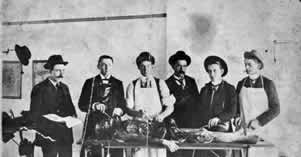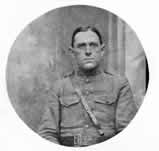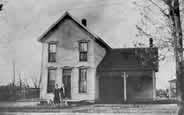 |
Volume IV, No. 1, Fall 1976 |
DOC BOB
by Lewis R. Monday
Looking back it seems to me that there were two problems my father faced as a horse and buggy country doctor in the Ozarks during the early part of the twentieth century--sometimes more work than he could Do and almost always less money than his family needed.
At the time I was born in 1908, we lived On the old family homestead located about half way between Richland and Stoutland, Missouri. Probably the first recollection I have concerning my father's profession is an event that occurred when I was about three or four years of age.
Late one night a hack (a team drawn vehicle that could nearest be compared now to a station wagon) stopped in front of the house. Stretched out in the bed of the hack was one of our neighbors who had been in a knife fight. He was barely conscious and surrounded by a few solemn friends. I have never since seen a man so cut up.
Of course, my father's first concern was infection. Then he did something that later I saw him do several times when the life of a patient was in danger. He took his medical supplies along with a few personal effects and moved to the home of the patient in order to be in attendence around the clock. He never left such a patient except for other genuine emergencies. I do not recall how long he was gone this time, but believe it was for several days, maybe a week.
When I was six and ready to start school, we moved to Richland. At that time Richland had no water system, so all toilets were outside. Baths (at least ours) were taken in a wash tub on the back porch after dark in the summer and in the house close to the fire during the winter. Family heat was by firewood and this included the cook stove.
There was a local light plant, but somehow I did all my studying by lamp light until after entering high school. Maybe this was because we could not afford a light bill. There just wasn't much money in circulation, at least as far as our family was concerned.
However, we always had plenty to meet our needs. At that time the area around our town was strictly rural and many bills were paid "in kind." Apples and potatoes were delivered, and in the fall any on hand or brought during the winter were buried in our back yard for protection from freezing weather. Meat was brought from time to time as well as corn and hay for the horses. Firewood was delivered, then sawed and split by others who wished to work out bills.
But my father was always unconcerned and indifferent about keeping track of services rendered. Almost every night my mother would get out her books and start prodding him about billing those who came to his office and for the house calls he had made. By the way, office visits were fifty cents.
I remember one of the well-to-do business men who just didn't pay his bills until my father would become ill and unable to work. On these occasions this good friend would show up and hand my mother a check for about twice the amount of his outstanding bills and ask that the extra -- be "put on the books." He had a rather large family and knew someone at his house would be sick "one of these days." I shall never forget him, not only for the way he handled his accounts with us, but for other real gestures of friendship, especially to me as I was growing up.
Naturally, with all the stories of the "old times" I heard then, I thought we were rather modern. Most doctors had four years of medical training, straight out of high school, and frequently went right into the practice, as was the case with my father who graduated from Washington University in St. Louis in 1905.
In Richland, my father's office was located, as you might expect, upstairs above the town drug store. The town was indeed blessed with good druggists, but my father often ordered various and sundry drugs from St. Louis and mixed many of his own remedies.
[14]
There was considerable railway side track switching in town, necessitating a section crew of several, and this, along with the usual run of farm injuries, required rather frequent treatment for trauma of varying degrees. That was when my father used the only anesthetic in the office--ether in cans that came on order from 'St. Louis. He administered it by placing a towel over the nose and mouth of the patient and sprinkling it with ether from the opened can. It goes without saying that this manner of using anesthetic was hazardous, and long before I was grown, I knew how the sudden spreading of certain sphincter muscles could have some effect on the breathing process.
A most distressing experience for me was to have to see a broken arm set. Often a friend or relative was involved. Of course, without the aid of x-ray, setting an arm was just a matter of feeling the broken bone and manipulating it to what felt like a good approximation of the bone fragments. This was very painful to the patient who often had to be physically held. Then the patient finally wound up with a splint made of shingles bound tight by bandage. That was all the doctors in the country could do in those days, I suppose, and I must say that some of my father's efforts came out with a healed but somewhat crooked arm.
So we were far from modern as compared to what we see when we look at the field of present day medicine. But psychology as a supplement to treatment was not unknown to doctors back in those days. I was early aware of the impression my father deliberately, I thought, tried to create after his examination of a patient at the home.
He would sit at the kitchen or dinning room table, open his medicine bag and ask for a plate and a case knife. Then, with the family usually gathered around watchfully, he proceeded to mix powders from various containers, sometimes tasting a bit of the mixture as though to make certain that he was getting the right result. Then, if it was a powder mixture, he carefully placed it in capsules and quietly spelled out the directions. This was practically a ritual, and although he was indeed administering medicine, he was also, I believe, attempting to impress the observers and give them some degree of faith and confidence.
Another instance in this same vein was the occasion when he placed a patient in one of our bedrooms for several days. She was a vacationer with a very bad case of poison ivy. Naturally, she needed, and could not get sleep, even after receiving all the sedation my father considered proper. On a couple of such occasions he would pour out a glass of buttermilk at the kitchen table, and as he went upstairs with it, he would mutter just loud enough for the patient to hear something she thought she was not supposed to hear--words to the effect that "what I have put in this will damn sure put her to sleep." She would drink the buttermilk and go to sleep all right, but it was only after she was able to go home that Father admitted to me there was nothing at all in that glass but buttermilk.
This old photograph was made at Washington University before 1905 while my father (fourth from left) was still a medical student.
[15]
The arrival of a baby was always a subject of community interest and the first baby of a marriage was sometimes subject to considerable finger counting. Early along the way I suspected some significance to the fact that most of the "seven month" babies were the first ones. To illustrate how my father often handled such situations, I shall relate one I happen to recall clearly.
After the delivery was over and everything settled down, I went into the house to get close to the fire. The baby's grandfather was seated in the corner of the room with a sour look on his face. His daughter, the new mother, was real quiet as was the new father. As my father was putting up his obstetrical instruments in preparation of departure, he made casual remarks to the effect that the baby was a healthy baby but that since it was a seven month baby, he would suggest that it be given somewhat unusual attention and that he be called upon the slightest indication of illness.
Right then everybody perked up and started looking cheerful and happy. All was well. Doc Bob had said this was a seven month baby and that settled the matter for them, once and for all.
I have vivid recollections of my father driving away from home in the middle of the night in sleet or snow to visit the sick with a lantern tied to the front of the buggy. He never made anything of it--just took it in stride. But there is no independent recollection on my part of him making a call by horseback, though I am sure that he often did so before my time or in my infancy, for his saddle bags are now in the possession of my grandchildren and many of the vials still have medicine in them. Going horseback was necessary in those days because of the condition of the roads, especially in bad weather, and because his destination could sometimes be reached only by trail.
He was always most careful about every detail of the care of the horses. I rarely helped him hitch up during freezing weather without hearing a warning from him about how to use the proper method of getting a freezing cold bit into the warm mouth of the horse I was handling.
Up until we acquired a Model T, we kept three geldings in stables back of the house, so each horse could rest every third day. They needed that rest, for while they were well cared for, always large and muscular, they were always driven at the most extended trot of which they were capable. We had "blowing" pauses at the top of long hills and we never crossed creeks and rivers without a short stop for water and rest.
While my father, Major L. R. Monday, M.D., was in World War I, he served mostly as transport surgeon, which meant going back and forth across the Atlantic on troop ships and treating soldiers. He made return trips so quickly he frequently could not find his "foot locker," an army issue trunk. So he had to get another one. After he returned home he received three or four in a few months, all empty.
[16]
Rocks in the roadways were always more than plentiful and a problem. Often a horse would get one caught in his shoe. The buggy always contained farmer's tools that were furnished to us as fast as we lost or misplaced them by my cousin, Fred Manes. (see Vol. II, No. 3, pp. 28-43 for stories about Fred Manes) Sometimes we could remove the rock with the small curved knife-like instrument. But if not, we resorted to a pincer and pulled the shoe off. The remainder of the trip was at a slow pace in consideration of the fact that one horse had a "bare foot."
Our team and buggy often traveled ten or more often hazardous miles at night. I sometimes drove the team at night while Father tried to catch a nap, but usually my older brother was the one to drive.
One dark night my brother and father crossed the Gasconade River when it was high. There was nothing unusual about fording rivers and creeks occasionally swollen by rain. But this night they were not in the water long before they both knew they were in trouble. The buggy began to skid downstream and the horses were indeed laboring. Father reached for his obstetrical bag and handed it to Gordon as he grabbed the reins and the buggy whip, the latter of which he used with great force. That was one of the very few times I ever knew of my father to flog the horses.
Even though water was running through the floor of the buggy, there was no turning back for that would surely have meant disaster. They could only go on, not knowing how much further to go or how much deeper the water would get. At last the horses began to get and hold firm footing and the buggy stopped its downstream skidding.
They reached their destination in time for him to deliver the baby and as much as Father was always determined to return home when his job was finished, this was one time he spent the night at the home of the patient.
He preferred to come home even if very late. I vividly remember that during the 1918 influenza epidemic I did not see my father for days at a time since he left long before I awakened and returned long after I had gone to bed.
Often I have been asked why I never aspired to become a doctor. While I admired the work my father did, and knew that someone had to do it, it never occurred to me that I would ever study medicine. I must not have been the type.
My father died in my junior year of high school. My mother and I stand before our house just before I began studying law.
[17]
Copyright © 1981 BITTERSWEET, INC.
Next Article | Table of Contents | Other Issues



